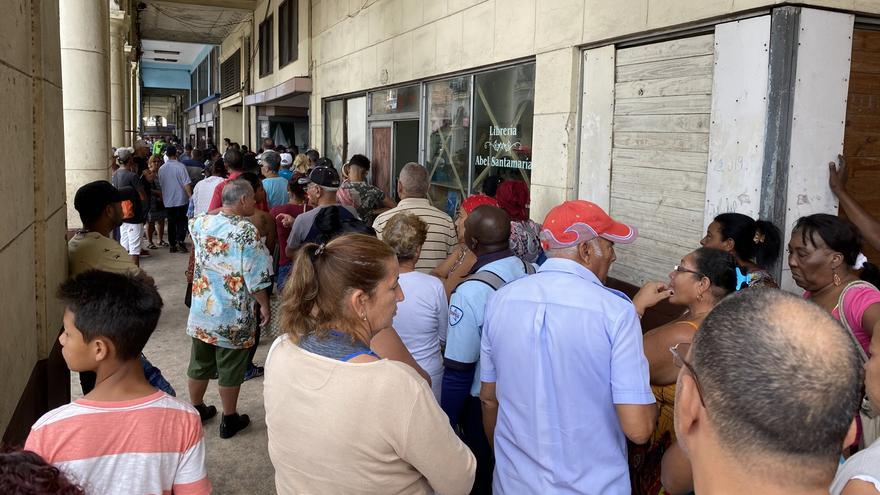
![]() 14ymedio, Havana, 9 February 2020 — Connected to Cuba by an umbilical chord of family relations and remittances, Cubans in Miami are following with concern the news of a resurgent economic crisis on the island, which has begun exhibiting itself in a shortage of basic goods.
14ymedio, Havana, 9 February 2020 — Connected to Cuba by an umbilical chord of family relations and remittances, Cubans in Miami are following with concern the news of a resurgent economic crisis on the island, which has begun exhibiting itself in a shortage of basic goods.
Faced with a reduction in Venezuelan subsidies, the latest U.S. sanctions on Havana for its support of Nicolás Maduro and a sizable foreign debt, Cuba is now experiencing a liquidity crisis that has forced authorities to buy fuel on the international market that Venezuela had been providing at subsidized prices.
“(Cleaning products) have been in shortage supply during the month of January. We still will not have satisfied demand by February or March but we hope that, with the various measures that are being adopted, we will be able to stabilize production and provide these products to consumers,” said Betsy Diaz Velazquez, minister of Foreign Trade.
In Miami, the city with the largest Cuban population after Havana, news of a new period of austerity is being followed with concern. In an interview with El Nuevo Herald, Lazaro Alberto Dominguez, a Cuban living in Hialeah, said, “All of my family is in Cienfuegos. A week ago I had to send them a package with coffee, lentils, garbanzos and other things because the situation keeps getting worse.”
Dominguez reports that, in addition to the hundred dollars a month he sends to his mother in Cuba, he has to periodically send packages of food, medicine and clothing.
“There’s nothing in Cuba. Even if you have money, you can’t find things in the stores. The government lays all the blame on the blockade [American embargo] but hotels manage to get everything they need,” he observes.
The 34-year-old man arrived in the United States two years ago by way of the Mexican border after requesting political asylum. However, he is not active in any opposition group.
“I don’t plan on returning to Cuba. I download Otaloa but I have to send things to my family,” he adds.
Alex Otaola is a Cuban influencer who hosts a daily program on Youtube seen by more than 10,000 people and who has led campaigns against remittances, travel and shipments to the island.
Remittances constitute the Cuban economy’s second largest source of hard currency. According to the Havana Consulting Group, Cuba received about 6.6 billion dollars in 2018 in the form of cash remittances and consumer goods, with 90% of remittances coming from the United States.
In the battered Cuban economy, income from remittances is exceeded only by the export of services, which in recent years has averaged around ten billion dollars. The Trump administration has set a limit of $1,000 per quarter on remittances, which can only be sent to relatives, in an attempt to force Cuba to abandon its ally and benefactor, the government of Nicolás Maduro.
The Cuban government has said that, due to US sanctions, it has had to choose between “maintaining a stable food supply” or paying for cleaning products. And the Cuban economy is highly dependent on imports.
Among the products in short supply are coffee, grains, fuel, gas, detergent, soap and toothpaste. In recent month shortages of items such as vegetable oil, chicken, meat and flour, as well as all products made from them, have also been reported.
With its network of inefficient state-owned businesses, Cuba must spend more than a billion dollars to import food that could be produced domestically. Nevertheless, the government persists in prioritizing ideology over the market in spite the advice of its own economists.
Belkis Veitía has lived in Little Havana for more than fifteen years. The only members of her family left in Cuba are two cousins; she and her two brothers left the country aboard a speedboat, arriving at the southern coast of Florida. The trip cost them almost $30,000, money they obtained from family members and by selling all their belongings in Cuba.
“I can’t forget the people of Cuba. Those of us who have lived through this tragedy know that those who are left behind need our help,” she says.
Veitía helps the local Catholic Church collect donations that are later sent to Cáritas Cuba and other NGOs working on the island.
“We ship a lot of medication, clothing and food to Cuba. The situation is hardest on the elderly. Thanks to the Catholic Church a lot of them are guaranteed lunch or dinner. They get government pensions but they are little more than ten dollars a month,” she says.
_________________
COLLABORATE WITH OUR WORK: The 14ymedio team is committed to practicing serious journalism that reflects Cuba’s reality in all its depth. Thank you for joining us on this long journey. We invite you to continue supporting us by becoming a member of 14ymedio now. Together we can continue transforming journalism in Cuba.
